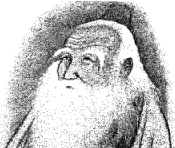Tao
Te Ching - a message of Peace, of Simplicity, of Humility |
|||
|

|
|
Tao - the Supreme, the Absolute, the All-Creative, the Way, the Root, the Source, the Unmanifest ONE. |
|
|
|
Te - the Manifestation of Tao in the objective world-process, cannot be translated by any single term. |
|
|
Ching - classic, psalm, or canon. |
Lao Tzu was born in the year 604 B.C., he has been called: "The Old Philosopher." He was himself a symbol of that Mysterious Virtue and Supernal Simplicity belonging to the servant of Tao, of which his writings speak. He was a messenger of Peace, of Simplicity, of Humility.
Lao-tzu had been troubled by the violence of his times. But he thought that it was a mistake to try to change people. He believed that people were naturally good. Man didn't have to be "controlled." Too much control was spoiling man. Lao-tzu wanted man to be closer to nature. He would have people live simple and peaceful lives.
The legend said, He wandered out to the western border of his state, riding his water buffalo. He searched for a place to live a simple life, close to nature and without trouble. No one ever heard of him again. But before he could cross the border, officials made him write down his ideas: "Live a simple life, be free, be yourself, and be close to nature. Do these things and you will be wise and happy." These words have been kept in a little book called Tao Te Ching.
"Tao-Te Ching" was Lao Tzu's only work, about 5,000 ancient Chinese characters, and might never have been written but for his disciple Yin Hsi, who urged him to leave some evidence of his teaching, when, at the end of his mission, Lao Tzu was on his way to the Western Haven, the Abode of Peace.



